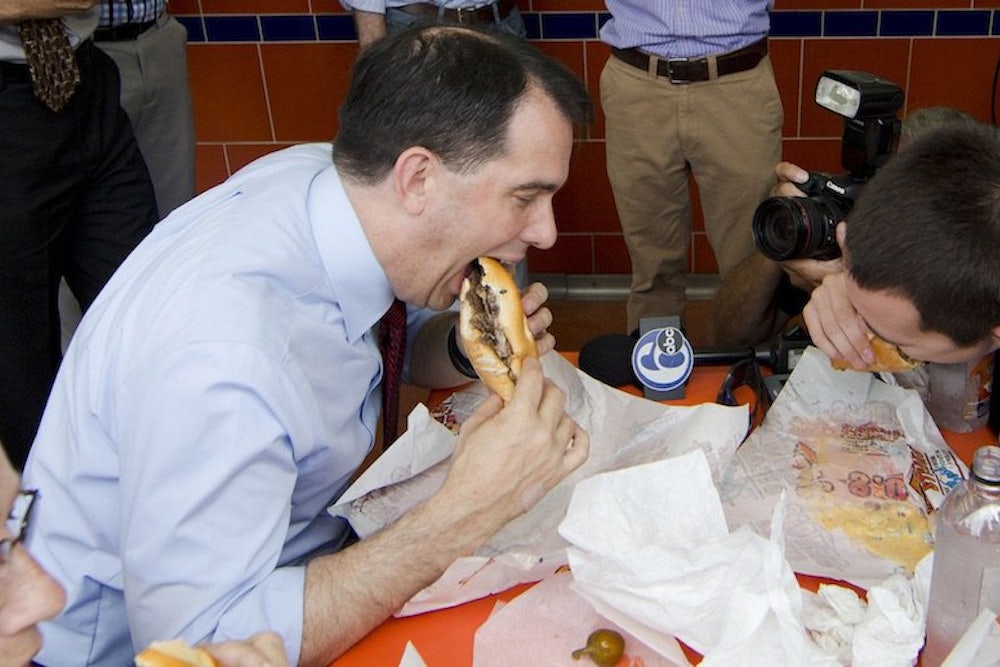Scott Walker’s bid for the Republican presidential nomination took him Monday to Philadelphia, where he—like many campaigners before him—took on the unexpectedly complicated task of placing the appropriate cheesesteak order in front of a gaggle of reporters. In a bid to avoid one local controversy, the Wisconsin governor visited both Geno’s and Pat’s, but he invited a separate controversy by choosing American cheese on his sandwiches.
I didn’t know Walker was at the neon-draped intersection of Ninth and Passyunk, just four blocks from my home, until after the fact. And while I can’t defend his militantly anti-union politics, coziness with the Koch brothers, or opposition to abortion, I maintain that he’s taking unfair heat for his order. If American cheese was categorically inappropriate, as some locals claim, it wouldn’t be on the menu along with provolone and Cheese Whiz.
Ordering a cheesesteak in Philadelphia is a delicate calculus. The right order at one location might not be the proper move across town (although, in my opinion, ketchup is never, ever appropriate). Pat’s, the originator of the cheesesteak, and its gaudier rival, Geno’s, are both volume operations. Television viewers who’ve never even been to the city may have witnessed, thanks to B-Roll during a nationally broadcast Eagles game, the speed with which the hoagies are assembled. And this haste, when combined with an order of either provolone or American, means that slices of neither cheese actually get melted into the thinly sliced steak (which is chopped at Pat’s, but not at Geno’s). To achieve the crucial “integration” of cheese and meat at either establishment, the only move is to ask for the Whiz, straight from the can.
Philadelphians eager to push their “foodie” bonafides argue that neither Pat’s nor Geno’s is any good—that true enthusiasts avoid both shops. They are wrong. There’s a time for these cheesesteaks—ideally late at night, as a sponge for alcohol. (Principled lefties might have stronger case in advocating a boycott of Geno’s, thanks to its late founder’s nativist politics and eagerness for the execution of progressive cause celebre Mumia Abu-Jamal.) Still, spots like John’s Roast Pork, Steve’s Prince of Steaks, and Tony Luke’s—all of which take the time to ensure that your sliced cheese gets properly melted into the meat—are higher on the list, and at all three, I advocate provolone to my out-of-town guests.
None of these standbys, however, offer Swiss cheese, the faux pas committed by John Kerry when campaigning for president in 2003. There’s a good historical reason for that. The cheesesteak is an Italian-American invention. The balls and logs of provolone that hang from South Philly Italian deli ceilings trace back to the wave of immigrants from Southern Italy at the turn of the last century. American and Cheese Whiz are products of the industrialization of food which proceeded in parallel with the cultural assimilation of the mid-twentieth century.
Cheese Whiz might make more practical sense at Geno’s and Pat’s, but it doesn’t quite have the same ring as “American,” too irresistible a word for a conservative Midwestern candidate looking to emphasize his “patriotic” values and appeal to the broad middle. But to that end, perhaps his real missteps were cutting in line at Geno’s and leaving his barely-eaten Pat’s steak on the table at the self-service restaurant for an untipped worker to throw in the trash. If John Kerry’s order made him appear out of touch with the city’s working-class sensibilities, Walker’s behavior was downright insulting.
Philadelphians eventually forgave Kerry: He won 80 percent of the city’s vote in the general election, a key to taking the state’s 20 electoral votes. Walker shouldn’t expect a similar result.
